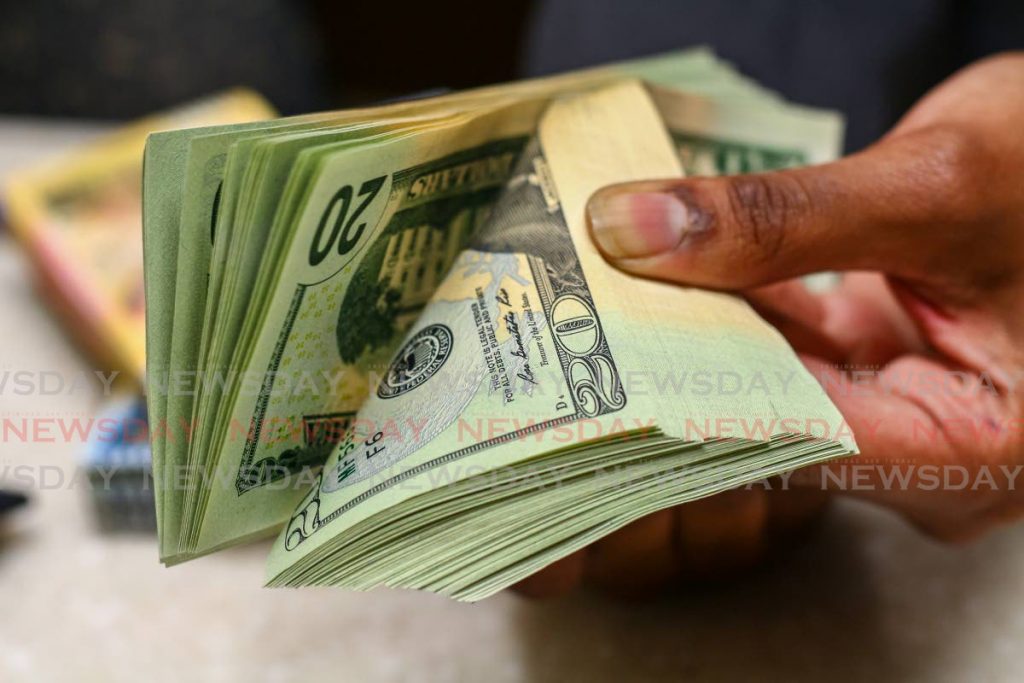UWI economist: Don't create self-fulfilling prophecy on forex

TT's foreign exchange (forex) can be affected by people's fear that it could depreciate.
Dr Dave Seerattan, economist at UWI, St Augustine, told Business Day in an interview on Monday that he is always apprehensive when speaking to the media about the depreciation of the TT dollar, mostly because people panic when they read such news and, like a self-fulfilling prophecy, do something to cause the dollar to drop.
"The foreign exchange rate is one of the issues that is beset by behavioural problems, psychological problems. I believe people behave irrationally at times, so we (economists) have to be very careful when we are discussing the foreign exchange market and exchange rate."
He said there is no doubt the current exchange rate is overvalued, but the problem decision-makers have is how to make the adjustment.
“A lot of people talk about depreciation being this magic bullet that solves our problem, but the truth is, no one policy is going to solve all the problems, and what you need is a mix of policy measures...and every policy will have costs attached to it, unintended consequences that you have to be cognisant about.
"The Minister of Finance is aware of all the different moving parts in the economy...But the economy is complex, and just saying depreciating the rate is going to solve our problems does not appreciate the complexities and the trade-off that you have on the policy."
The government, Seerattan said, has been making a "huge effort" to reduce the fiscal imbalances. These include raising revenues through taxation and cutting government expenditure. Closing Petrotrin and restructuring WASA were also among actions taken.
While necessary, he said, people are losing their jobs, and those in the lower socio-economic brackets experience the brunt of the financial strain.
Rationing forex was another way the government tried to control the exchange rate. The Central Bank will give guidance to banks and authorised forex traders on how much to ration.
"They have rationed the supply of foreign exchange to the business community and consumers; that has been one way in which they have managed the huge challenge we have with the diminishing foreign-exchange earning.”
That rationing, however, affects small and medium businesses.
“We’re seeing a lot of medium and small businesses claiming they are not getting their foreign exchange supply in a way that allows them to transact their business efficiently.”
A decrease in the variety of imported products is another unintended consequence of rationing, because merchants are trying to reduce the amount they spend on products. The variety of cereal, for example, he noticed, has decreased in supermarkets.

"It is one of the moves we need to take, because the fiscal deficit is relatively large, and that has consequences for debt shortage of foreign exchange in the market and a whole host of other problems. I would more characterise it as something that is necessary and we have to do."
Right now, TT is spending more money than earning. Cutting expenditure has a negative short-term impact on growth, but by cutting government expenditure, in the long term, by dealing with these problems, there will be more security for the economy.
However, Seerattan thinks TT is close to a stage where if the government reduces expenditure any more, it will be counterproductive to growth.
"That is why the government has to think about alternative policy measures to deal with some of the imbalances we have with the external account."
Seerattan said the foreign exchange rate is also affected by consumer behaviour and can be negatively affected by emotion and fear. He said if economists predict a certain rate, people would do things to push the rate to that number.
One of the ways the TT dollar could depreciate based on public behaviour is by people preferring to keep their money in US dollars and open US-dollar bank accounts than save their money in TT dollars.
"The reason why people have that belief is that they want to hold it in US dollars because they are fearful of depreciation. If you are holding TT dollars and the next morning the exchange rate decreases by 20 per cent, the value of your wealth reduces by 20 per cent, but if you have it in US dollars, that protects you against that."
The other thing that incentivises people to have US assets over TT is that the rate of return is almost equivalent.
"If you have a deposit in US dollars, you are getting a little less than one per cent. If you have an account at a local bank you'll get one per cent. So if you have two types of deposits, given the fear they have of depreciation..."
He said the rate is highly controlled by Central Bank and the government. As part of an agreement with the International Monetary Fund, the government has to declare what the exchange rate is.
The country, Seerattan said, is not in a crisis situation or near a forex shortage.
"By any metrics, our foreign reserves is adequate to meet current demands. A crisis is when you can't afford to buy medicine and food and meet international obligations.
"If we were at that point, we would have to go to the IMF, cap in hand, to ask for a loan. The point of our foreign exchange reserves is (US) $6.8 billion plus the reserves we have in the Heritage and Stabilisation Fund. We are not close to crisis, yet.
"But if we continue as we are, we are eventually going to run down our reserve to a point where we would have to go to the IMF to seek support."
He said where people get the "sky is falling" feeling comes from comparing the country's economy to what it was like in 2005, 2006 and 2007. In those years, the GDP growth rate was 6.2 per cent, 13.2 per cent and 4.8 per cent respectively.
"If you want to get a good indicator of this thing, you have to compare where we are now to where we were in 1981, when we were in a similar shock."
Between 1974 and 1981 the country had an average annual GDP growth of 5.5 per cent, but it shrank between 1982 and 1987. As in the past five years, the government cut spending, slashed public-sector salaries and put higher taxes on imports to restrict buying. This was on the advice of the IMF. The country devalued the currency as well.
Seerattan warned media institutions to be careful in reporting about the economy and the forex situation and not to perpetuate a doom-and-gloom outlook.
"Communication is very important. You could actually accentuate the problem, and you have to be careful how you communicate these ideas to people. We have to think rationally. The only way to deal with the hysteria is to confront the hysteria with facts.”


Comments
"UWI economist: Don’t create self-fulfilling prophecy on forex"